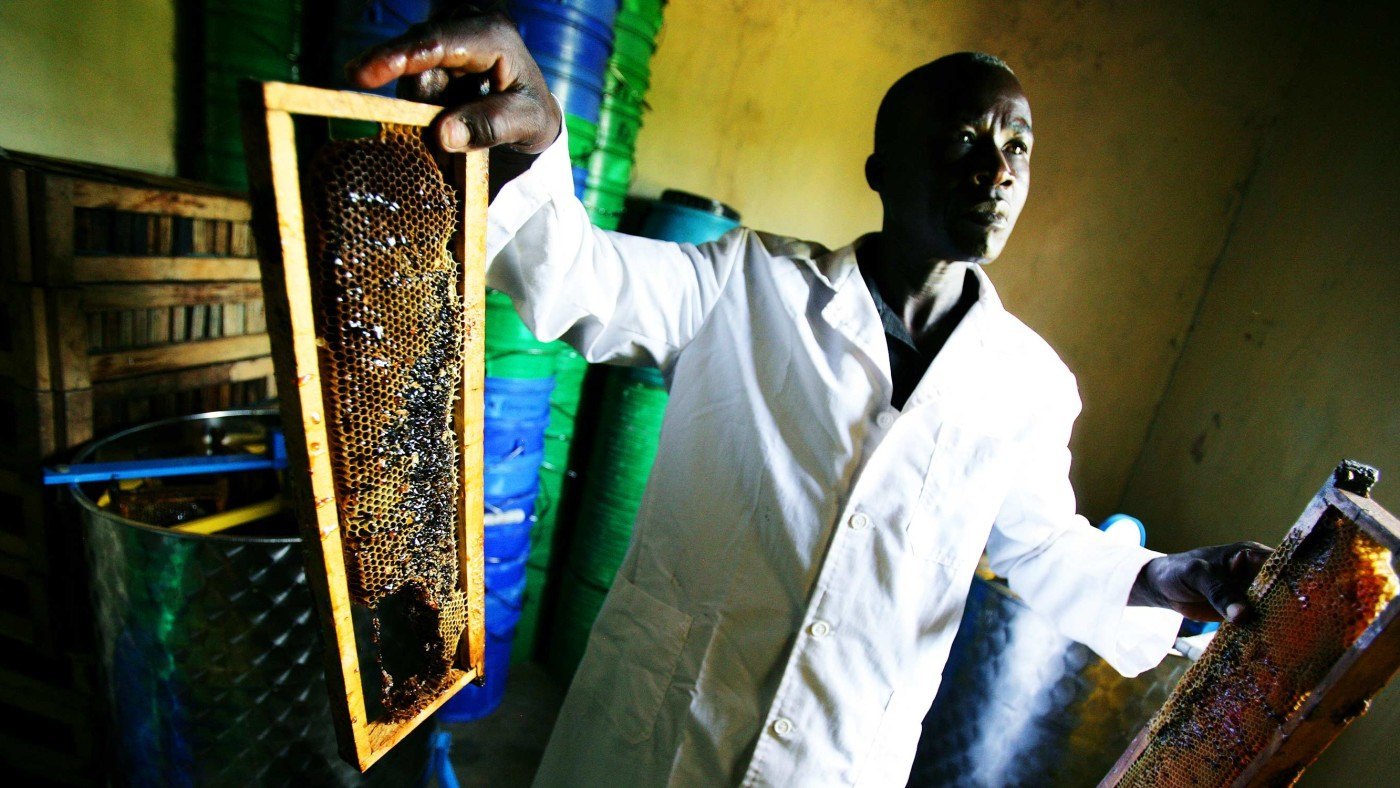Despite an increasingly wealthy urban minority, nearly half of all Kenyans live below the poverty line. The vast majority of these people live in rural areas. The sad thing is there is money to be made buzzing around in the air above their heads. Demand for honey in Kenya far outstrips supply, as a result more than 90 per cent of honey in Kenyan supermarkets is imported. Tapping into this market, and the rising global demand, has the potential of lifting thousands of people out of extreme poverty.
Honey harvesting in Kenya has historically been a small scale exercise, done with old fashioned log hives. Production is low and the hives are inefficient. Knowledge of the industry, and the potential the market could provide, is minimal and is perceived as an activity only suitable for traditional honey collectors – mainly old frail men. Training provided by the government is poorly funded and sporadic. Civil society groups have realised that if they equip poor farmers in rural areas with access to the facilities to harness this natural resource, the power of the market can do the rest.
Beekeeping is relatively easy for poor households to get into, it doesn’t require much in terms of land ownership or education and if equipped with more modern hives it can be an effective source of income.
John Kitonga, Chairman of Bairunyi Beekeepers, said: “Including other groups, we have over 100,000 beehives in Mount Kenya Forest. But in this forest alone you could put up over five million beehives because there are very many trees and there are very many bees. If we have the finances and people know that this business is growing everybody would want to join it. But we can only tap this honey if we have the resources. We need a lot of training especially in honey refineries and in business entrepreneurship.”
Charities like Christian Aid are working to develop honey hubs in Kenya. Run as sustainable enterprises, the hubs are an example of effective collaboration between civil society and the private sector. They will centralise the processing of the honey, offer specialist machinery, and provide large scale storage. Most sales conducted by poor producers are in small quantities of unrefined, low value, honey by the roadside. The hubs are able to facilitate bulk sales of larger orders, ensure quality control and foster relationships with buyers. For normally isolated farmers the hubs are a place where they can share information and access loans. Crucially they can also explore developing related products such as beeswax and candles, further diversifying their income, making them more resilient to market shocks. As well as the large demand for retail based honey products there is also an industrial market for unrefined honey used in pharmaceuticals or cosmetic products by companies in Nairobi.
The global demand for honey is also burgeoning, driven primarily by Muslim majority Gulf States. Honey is a treasured substance among many Muslim communities. Not only does the Quran speak of its healing properties it is also one of the foods served in Paradise. The Prophet Mohamed prohibited the killing of bees and there is even a book of the Quran called ‘The Bee’. Tapping into the honey market in the United Arab Emirates and Saudi Arabia is the holy grail for honey producers the world over. On the Arab market a pot of honey can fetch more than double the price of an entire kilo in Kenya. As well as significant purchasing power the demand for premium products in the UAE means there is money to be made from Kenyan honey’s unique flavour profile. With the right quality control and marketing of specialist varieties such as ‘Maasai Mara’ honey, there is much potential.
The business of honey is also helping to protect the environment. During periods of drought and food shortages the cutting down of trees to make charcoal for sale is common. By demonstrating the money making potential of beehives this deforestation is being halted. Kathy Mbondo was a flower exporter until the euro crisis in 2011 wiped out her business. With the help of a UK aid programme called BRACED, she turned to bees and started to convince her community that their local Acacia trees could provide a profitable dividend through honey rather than as a one off asset sale for charcoal. An Acacia tree can produce four bags of charcoal worth a total of Ksh 1000 ($10). But a single beehive on the same tree produces 20kg of honey a year, worth Ksh 5000 ($50). Mbondo has 50 hives herself on her parents farm and other local farmers are now following suit.
With the right support, the bee business has the potential to bring multiple benefits to Kenya and see the fortunes of some of the country’s poorest people blossom.


